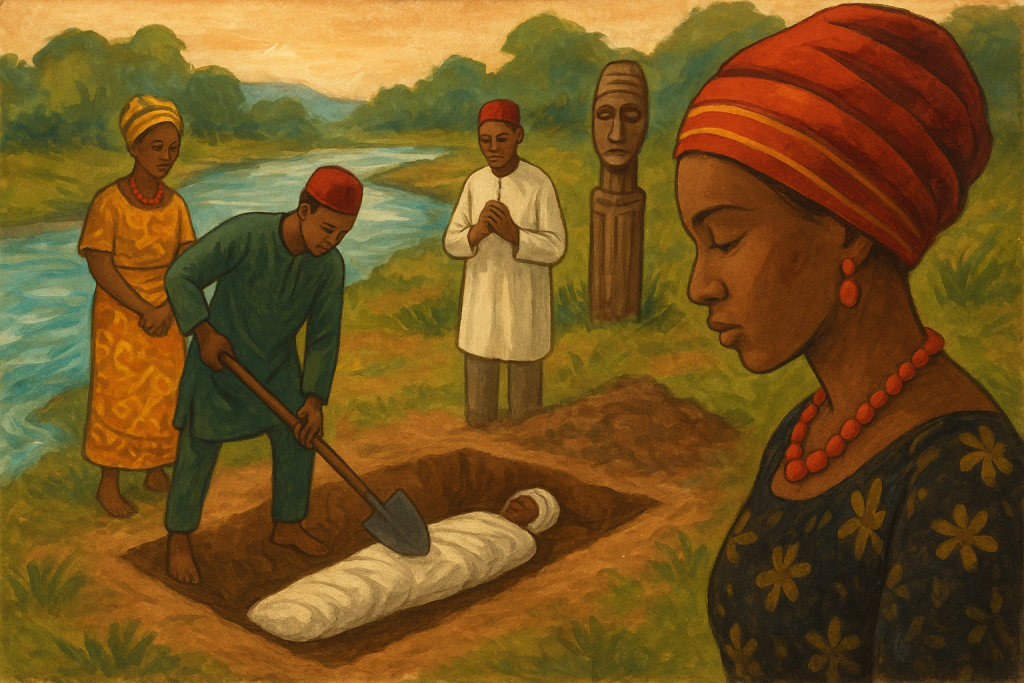The Concept of Burying The Drowned At The Riverbank
The Tradition of Burying the Drowned in Igbo Culture is governed not only by grief but by long-held spiritual beliefs about rivers, spirits, and the boundary between the living and the ancestral world. When a person drowns, the way the body is treated and buried in many Igbo communities differs from other burial rites.
In some parts of Igboland the customary response has been to bury the drowned near the riverbank at or close to the place where they drowned or to perform specific offerings to the river a practice rooted in traditional cosmology and local ritual logic.
Rivers in Igbo Spirituality
Rivers in Igbo cosmology are not simply physical features; they often have spiritual agency. Water bodies are associated with deities, spirits, and thresholds between worlds. Because of this, deaths that occur in water are sometimes treated differently from other deaths.
The water is seen as part of the event that took the life, and the spirit of the drowned may be thought to remain connected to the river unless proper rites are performed. This concern explains why burial beside the river or rites to the water-spirit are performed to prevent the spirit from becoming restless or interfering with the community.
What The Rite Often Involves
Practices vary across communities, but common elements reported in oral tradition and contemporary accounts include:
- Burial near the riverbank at or close to the spot of drowning.
- Ritual offerings to local water deities, performed before or after burial, to ensure spiritual acceptance.
- Family and community involvement in carrying out rites that prevent taboos or spiritual imbalance.
In some communities, a secondary burial or memorial may follow later, to integrate the deceased into the lineage of ancestors properly
Reasons Behind The Practice — Practical And Metaphysical
Spiritual safety: Many believe a body recovered from water must be treated differently to avoid spiritual contamination or unrest. Burying at the river or performing water-specific rites addresses that risk.
Restoring balance: The river is part of the “scene” of death. Treating the body at the river acknowledges the river’s role and shows respect to river deities.
Preventing misfortune: Oral accounts and local tradition sometimes warn that improper disposal of a drowned person’s body may lead to misfortunes (illness, bad luck) attributed to neglected spirits.
Historical Echoes And The Diaspora
Stories about people choosing the water over bondage notably the Igbo Landing episode in U.S. Black Atlantic memory show that the ocean and waterways have long been invested with moral, spiritual and political meaning for Igbo people and their descendants. While Igbo Landing is a distinct historical event in the diaspora, it underscores how water can symbolize refuge, resistance, and sacred significance in collective memory.
Variation, Change, And Contemporary Realities
Not all Igbo communities follow the same tradition, and modern realities have reshaped burial practices:
Blended Practices: Some families still perform symbolic rites at the river — such as offerings — even if the actual burial happens elsewhere.
Christian Influence: Christianity, now widely practiced, often encourages conventional burial in cemeteries or family compounds.
Legal and Health Requirements: Today, drowned bodies often must be examined by authorities before burial. Mortuaries and public health laws sometimes override older customs.
Conclusion
The Igbo practice of burying those who drown at the riverbank where they died reflects a worldview in which rivers are sacred, powerful, and deeply tied to human destiny. While modern life has reshaped how communities approach drowning deaths, the cultural logic behind these rites continues to echo in Igbo spirituality and collective memory.
By exploring these traditions with respect, we gain a window into how the Igbo people see the delicate balance between life, death, and the spiritual forces that flow through the waters.
FAQ
Q: Why do some Igbo communities bury the drowned near the river?
A: In Igbo traditional belief, rivers are sacred and connected to spiritual forces. Burying the drowned at the riverbank honors the river’s role, appeases water spirits, and ensures the deceased’s spirit rests peacefully.
Q: Do all Igbo people still follow this practice today?
A: Not all. While some communities continue the tradition, others blend it with Christian practices or follow modern legal and health rules, often holding symbolic rites at the river but burying elsewhere.



